|
|
|
Sort Order |
|
|
|
Items / Page
|
|
|
|
|
|
|
| Srl | Item |
| 1 |
ID:
112655
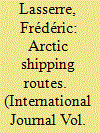

|
|
|
| 2 |
ID:
178064
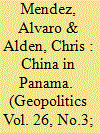

|
|
|
|
|
| Summary/Abstract |
The globalisation of China’s development strategy, from its origins as infrastructure diplomacy connecting its domestic west with its Central Asian periphery, into the transnational Belt and Road Initiative encompassing the periphery of the world system, epitomises the rapid evolution of a Chinese grand strategy of great economic and political ambition. The small state of Panama is a key node in the global trading system that can make an unexpectedly large contribution to China’s national security and international influence. Accordingly, China’s economic statecraft in Panama is not only opening up the Latin America and Caribbean markets to further Chinese commercial penetration, but is simultaneously expanding its political influence in this remotest part of the global South. China’s is a two-track grand strategy positing to other nations a choice between a liberal internationalist co-prosperity and a zero-sum realist contest. This audacious approach relies on relational power amongst small states, especially semi-peripheral ones like Panama, to put China at the forefront of what is shaping up as a grand coalition of the global South collectively challenging American hegemony.
|
|
|
|
|
|
|
|
|
|
|
|
|
|
|
|
| 3 |
ID:
113211
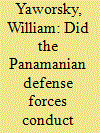

|
|
|
|
|
| Publication |
2012.
|
| Summary/Abstract |
This article reviews the circumstances surrounding a relatively obscure and almost forgotten US Marine Corps and Army security enhancement operation undertaken in Panama that commenced in early April of 1988. Marines were sent to Panama to protect oil and ammunition storage facilities from potential saboteurs. By April 1989 they had reported sighting armed, uniformed intruders on at least 43 occasions and receiving gunfire or discharging their own weapons during 16 incidents. Yet despite the repeated barrages of small arms fire over the course of a year, they failed to recover enemy ammunition, bodies or body parts and their own equipment and positions displayed no signs of suffering from hostile fire. This article analyzes the events from the point of view of a veteran of the operation and highlights the role that psychological operations may have played in generating the situation.
|
|
|
|
|
|
|
|
|
|
|
|
|
|
|
|
| 4 |
ID:
042579
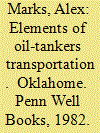

|
|
|
|
|
| Publication |
Oklahome, Penn Well Books, 1982.
|
| Description |
xix, 515p.Hbk
|
| Standard Number |
0878141847
|
|
|
|
|
|
|
|
|
|
|
|
Copies: C:1/I:0,R:0,Q:0
Circulation
| Accession# | Call# | Current Location | Status | Policy | Location |
| 026539 | 665.543/MAR 026539 | Main | On Shelf | General | |
|
|
|
|
| 5 |
ID:
015381


|
|
|
|
|
| Publication |
Jan 1992.
|
| Description |
210-234
|
|
|
|
|
|
|
|
|
|
|
|
|
|
|
|
| 6 |
ID:
015797
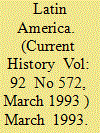

|
|
|
| 7 |
ID:
133082


|
|
|
|
|
| Publication |
2014.
|
| Summary/Abstract |
Panama recently enacted a new law, which aims to promote wind energy by mandating long term power purchase tenders. The implications of this new law lend some uncertainty to Panama×s electricity development pathway. This paper quantitatively analyzes the current status of power generation in Panama, and explores various potential future scenarios and the associated impacts on the system marginal cost, global warming potential, and resource diversity index. To this end, this study applies the scenario development methodology developed by Schwartz in the context of the energy-economic modeling platform 'Long-range Energy Alternative Planning' (LEAP). Four scenarios are developed and analyzed. The Business as Usual scenario extrapolates the electricity generation trend that has been observed over the last decade; it is compared to three alternative scenarios which have more specific objectives. Scenario 1 encourages climate mitigation without incorporating new technologies in the generation mix, Scenario 2 maximizes resource diversity, and Scenario 3 minimizes global warming potential. For each scenario, the composition of the electricity generation profile, system marginal cost, global warming potential, and resource diversity is predicted quantitatively. These scenarios to not attempt to forecast likely developments, but rather illuminate the tradeoffs that different development pathways entail.
|
|
|
|
|
|
|
|
|
|
|
|
|
|
|
|
| 8 |
ID:
160398
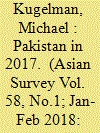

|
|
|
|
|
| Summary/Abstract |
The ouster of Prime Minister Nawaz Sharif marked the culmination of a tumultuous political year in 2017 for Pakistan. On the external front, tensions with India, Afghanistan, and the United States soared before abating, albeit modestly, later in the year.
|
|
|
|
|
|
|
|
|
|
|
|
|
|
|
|
| 9 |
ID:
145347


|
|
|
| 10 |
ID:
104276
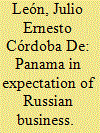

|
|
|
|
|
| Publication |
2011.
|
| Summary/Abstract |
International Affairs: Mr. Ambassador, it is known that the interoceanic Canal has been and remains Panama's greatest national asset. How does this waterway operate today?
Julio Ernesto Córdoba De León: Panama is a small country but has many advantages. First of all, this includes Panama's privileged geographical position and our interoceanic Canal with an average annual traffic of 14,000 vessels. Due to the modern infrastructure built in the country, we account for 5% of world trade. Six ports along the Canal connect the republic with more than 80 countries by 144 maritime trade routes. The Canal handles about 4% of global cargo traffic and 16% of U.S. cargo traffic.
|
|
|
|
|
|
|
|
|
|
|
|
|
|
|
|
| 11 |
ID:
115466


|
|
|
| 12 |
ID:
133593
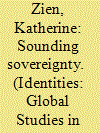

|
|
|
|
|
| Publication |
2014.
|
| Summary/Abstract |
The Panama Canal's handover from US governance to Panamanian sovereignty concluded on 31 December 1999. 'Patria Entera' (loosely translated as 'Whole Homeland'), a state-sponsored open-air concert, commemorated the handover and promulgated new readings of the Panama Canal Zone's decolonisation process. Concert headliner Rubén Blades deployed repertory and symbolic strategies to counterbalance Panamanians' ambivalence regarding the handover. 'Patria Entera' recast the Panama Canal Zone as an accessible space and narrated the handover as the Panamanian citizenry's collective inheritance of the Canal and accompanying Zone. Yet the concert's discursive arc overlooked persistent and emerging challenges.
|
|
|
|
|
|
|
|
|
|
|
|
|
|
|
|
| 13 |
ID:
015801


|
|
|
|
|
| Publication |
March 1993.
|
| Description |
102-105
|
|
|
|
|
|
|
|
|
|
|
|
|
|
|
|
| 14 |
ID:
114701
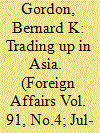

|
|
|
|
|
| Publication |
2012.
|
| Summary/Abstract |
The Trans-Pacific Partnership, a massive multilateral trade agreement now in the works that focuses on the Asia-Pacific region, could add billions of dollars to the U.S. economy and solidify Washington's commitment to the Pacific. But if the Obama administration fails to calm critics of the deal, there is a growing possibility that it could collapse.
|
|
|
|
|
|
|
|
|
|
|
|
|
|
|
|
| 15 |
ID:
130373


|
|
|
|
|
| Publication |
2014.
|
| Summary/Abstract |
UN member states should focus on significantly improving implementation of existing sanctions to slow North Korea's prohibited nuclear and ballistic missile programs rather than passing new measures, a March 6 report to the UN Security Council recommended. The report, written by a panel of experts authorized under UN Security Council Resolution 1874 in 2009, found that North Korea has developed "multiple and tiered circumvention techniques" to evade sanctions and continue work on the banned programs but that states have "adequate tools" to prevent Pyongyang's illicit trafficking.
Together, Resolutions 1718, 1874, 2087, and 2094 prohibit arms sales and transfers of nuclear and ballistic missile technology to North Korea, ban the sale of luxury items to Pyongyang, and give states broad authority to inspect North Korean cargo suspected of violating these measures if it passes through their territories. The mandate for the panel of experts includes assessing the effect of the sanctions on North Korea's nuclear and missile programs and providing recommendations for better implementing restrictive measures on Pyongyang. An incident last July involving a North Korean ship carrying Cuban weapons helped inform the panel's recommendations, as it gave them "unrivalled insight" into the ways that Pyongyang circumvents sanctions, the report said. Panama stopped the ship carrying Cuban weapons to North Korea on July 15, charging a violation of UN Security Council sanctions that prohibit transfers of arms to Pyongyang. (See ACT, September 2013.) According to a July 16 statement by the Cuban Foreign Ministry, the "obsolete defensive weaponry," made in the Soviet Union, was being shipped to North Korea for repair. After investigating the ship's cargo, the panel found that the shipment violated UN Security Council resolutions prohibiting the "indirect supply, sale or transfer" of arms to North Korea. Under the resolutions, Pyongyang also is not permitted to provide "technical training, advice, services or assistance" related to the maintenance of weaponry, the panel said. According to the report, the illegal cargo was hidden among bags of sugar and included two MiG aircraft, 15 MiG aircraft engines, components for surface-to air-missiles, ammunition, and "miscellaneous arms-related material."
|
|
|
|
|
|
|
|
|
|
|
|
|
|
|
|
| 16 |
ID:
137373


|
|
|
|
|
| Summary/Abstract |
This analysis draws lessons about the failure of Wilsonian Pan–Americanism from an examination of the American occupation of Chiriquí, Panama, an event long neglected by historians. It argues that the Woodrow Wilson Administration missed an opportunity to demonstrate to Panamanians, and Latin Americans more generally, the benefits to be gained by accepting its tutelage and leadership in inter-American affairs. Rather than collaborate with a sympathetic Liberal regime in Panama City, Washington embarked on a unilateral mission to re-make a part of Panama in its image. The result was a surge of nationalist resistance that threatened the overthrow of the government in Panama City and hastened the end of the occupation. Chiriquí is representative of American efforts in the region before the 1930s and helps to explain Wilson’s failure to build a “new world order” in the Western Hemisphere.
|
|
|
|
|
|
|
|
|
|
|
|
|
|
|
|
| 17 |
ID:
064085
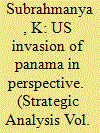

|
|
|
| 18 |
ID:
108745


|
|
|
|
|
| Edition |
Rev. Ed
|
| Publication |
Cambridge, Cambridge University Press, 2011.
|
| Description |
xi, 578p.
|
| Standard Number |
9780521177733
|
|
|
|
|
|
|
|
|
|
|
|
Copies: C:1/I:0,R:0,Q:0
Circulation
| Accession# | Call# | Current Location | Status | Policy | Location |
| 056357 | 355.033573/MAR 056357 | Main | On Shelf | General | |
|
|
|
|
|
|
|
|
|